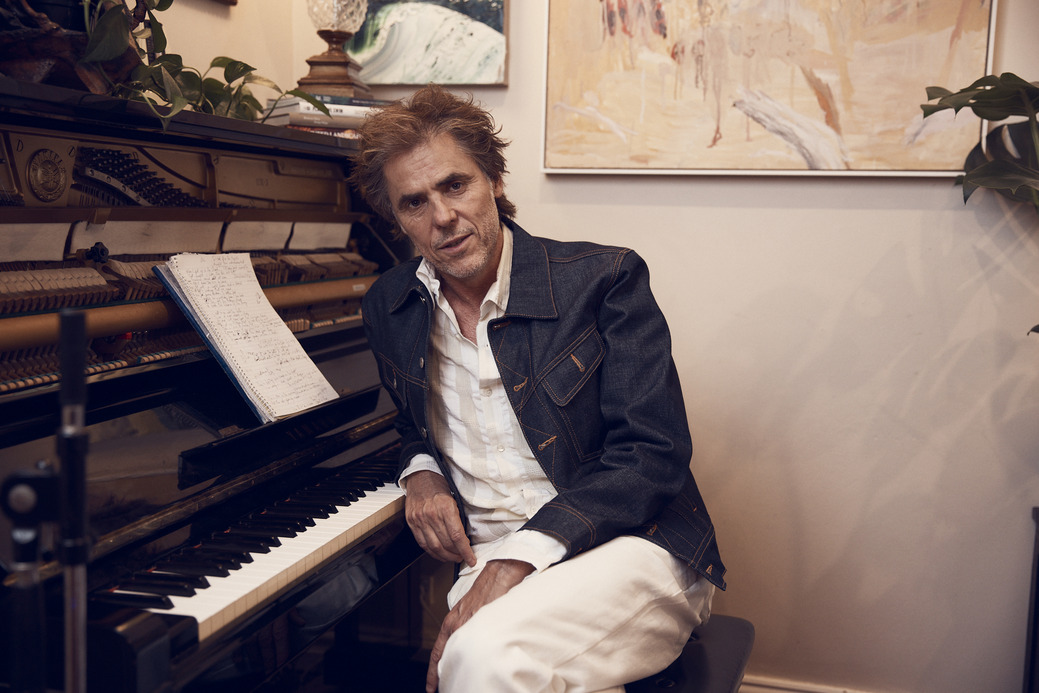Tim Freedman’s initial name for his first country music group did not make it onto the cover.
“’Tim Freedman’s a Country Member’ was quickly discarded,” he reveals. “It seemed like a very good idea, three schooners in.”
The phrase, of course, referenced one of former Labor Prime Minister Gough Whitlam’s most famous parliamentary quips. (“I’m a country member,” declared rural Liberal MP Sir Winston Turnbull. “I remember,” Whitlam deftly replied.)
The country miles The Whitlams singer-songwriter had spent traversing the Eastern States across 70 solo shows in 2020-21, however, had ultimately given him other ideas and a deeper sense of connection to rural Australia. Driving from Gunnedah to Mudgee via Black Stump Way, he was pleasantly surprised to learn that “Man About a Dog”, The Whitlams’ single he was touring in support of, had been added to local country radio.
“I’m a parochial lyric writer, and country music has a strong sense of time and place,” he says, “so clothing my stories in a country music coat seemed like a natural progression to me. I had to scratch that itch and investigate.”
The result is a country album called Kookaburra (Tone Deaf‘s Record of the Week earlier this month) by an iteration of the band called The Whitlams Black Stump, the spine of which was recorded in four days in a Sony Music basement with producers Matt Fell (bass) and Rod McCormack (banjo/guitar), plus Whitlams mainstay Terepai Richmond (drums), Ollie Thorpe (pedal steel), and George Washingmachine (fiddle).
It’s typically eclectic as is Freedman’s way, but that country coat really does shine. It opens with “Man About a Dog”, the song that helped kick off Freedman’s drive for the project but was laid down almost as an afterthought on the last day of recording. He played it to McCormack who crafted a jazz-tinged country acoustic arrangement with lovely pedal steel/fiddle interplay.
Love Music?
Get your daily dose of metal, rock, indie, pop, and everything else in between.
“It sounds like a drive through country hills, with my elbow in the breeze and the earth waking up after the rain,” Freedman notes. “Starting with Rod’s banjo, it sets my mind next to a campfire. It’s my transcendent moment in nature.”
A number of Whitlams songs are revisited and reimagined on the album, including a cooly stripped back version of 1998’s ARIA Song of the Year and triple j Hottest #100 topper, “No Aphrodisiac”.
“I enjoy singing old Whitlams tunes a bit lower now,” Freedman says. “This is three minutes of sitting next to a banjo player, singing that Whitlams song that everyone knows. I like the restraint of this recording, and Matt’s production really jumps out of the radio.”

“Fallen Leaves” is a sweeping, gently epic thing of beauty, and comes courtesy of prolific songwriter Perry Keyes, an old friend of Freedman’s. “At a solo show at The Great Club in Sydney in 2021 I happened to mention to my guest Perry Keyes that I was doing some country sessions soon,” he recalls.
“When I got offstage he said he’d already written two new songs in his head. The next day he sent them over, and Matt Fell and I thought they would make one great song. We threw in some Elvis Costello and a nine-piece string section, and here you have it – 17 chords and the truth.”
The Whitlams songbook is again revisited with “In the Last Life” from 2022’s Sancho album. It’s a slice of Freedman’s life from a particular time and predicament given new musical poignance.
“This character is from my time on the periphery of the horse racing industry where I fooled around from 2012-2018, and absorbed tales of blokes who were always just ‘doing their best,’” Freedman explains. “The song originally appeared on Sancho and was played on the radio a bit. In the studio the song seemed to enjoy a slower exposition, and it begged for the so-called crying machine (pedal steel) which Ollie delivers in a plaintive extended intro.”
“The Day John Sattler Broke His Jaw” honours the 1970 Rugby League Grand Final at the SCG when Rabbitohs Captain John Sattler continued to play after sustaining a serious jaw injury just three minutes into the game against the Manly Sea Eagles. It’s of a long-ago era not forgotten.

“With a classic lyric by Perry Keyes,” notes Freedman, “who lays out a social history of Waterloo and Redfern played out over three decades in five wonderful verses. Perry and I became friends in the early ‘90s at the Sandringham Hotel, where we bonded about memories of attending Rugby League matches in our childhoods. Nearby on the footpath outside the pub, Johnny-come-latelys would be talking excitedly about the new Sydney Swans.”
“You Sound Like Louis Burdett” is well-established in Whitlams lore: the first single from 1997’s breakthrough Eternal Nightcap album, it reached #53 in that year’s triple j Hottest #100. In this new iteration it’s imbued with a Tex-Mex makeover to make the night last a little longer.
“This became our set closer on the ‘Big City Debut’ tour of April 2023, and it always gets the room shaking,” Freedman says.
“At the merchandise desk after shows I’ve had numerous childhood memories shared with me about the second chorus – “All my friends are fuck ups / But they’re fun to have around” – in which kids, now grown up, were allowed to swear with their parents for the first time as they sang along from the back seat of the car.”

Freedman says that the Bernie Hayes-penned “Your Boyfriend’s Back in Town” always had “a title that was crying out to become a country song,” and indeed that day has come.
“In the mid-‘90s The Whitlams would play Newcastle University every six weeks on Tuesday lunchtime and drive back down the highway to get my colleague Stevie Plunder to his weekly gig with his brother Bernie Hayes, the acclaimed Inner West songwriter,” he recalls.
“This was my favourite of the songs they would sing. I covered another of Bernie’s songs, “Made Me Hard”, in 1999, and have had my eye on this one to tackle for many years. Ollie re-recorded the solo after seeing the Paul McCartney concert – can you hear Wings in there?”
The honky tonk piano-led down-on-one’s-luck ode “Nobody Wants to Be You” is a song by German-based US songwriter Dan Reeder, once described by The New Yorker as “one of the foremost outsider artists in modern folk.”
“I’ve followed him for a few years now,” Freedman says. “He’s a true original who writes some wonderful songs about the wrong side of the tracks, with a very dry wit. I threw this song at the band, and they threw it back to me morphed into a few minutes of Randy Newman meeting Lyle Lovett.”
“There’s No One” was the final track on 1999’s Love This City album that Freedman wrote on a battered upright piano in the Railway Friendly Bar during a tour stop in Byron Bay in 1994 on an afternoon off.
“We’d spent the drive up the coast stopping at phone booths so the other chaps could continue the argument with their girlfriends that started back in Sydney the night before they left,” Freedman remembers. “I was feeling very smug about being single. Once again the pedal steel guitar gives it a new life.”

“Blow Up the Pokies” is another iconic song in The Whitlams’ canon, with lyrics written by Freedman in 1999 when the proliferation of poker machines in Sydney’s live music venues threatened the very livelihood of the city’s musicians.
“This fresh version was born when the Wesley Mission contacted me in May 2022 and asked for a reworking of the song that could be used as the soundtrack to their poignant Gutful of Gambling TV ad,” he explains. “Re-jigged from the original’s waltz time signature to 4/4, sung in a lower key, and driven now by banjo and pedal steel guitar, the message is just as relevant today as it was last century.”
Country meets funk on 2022’s “50 Again”, as Freedman takes on the voice of an old punter in palliative care singing to his nurse. “The sort of old bloke who always thinks he’s a chance,” he says. “I was betting with tomorrow’s paper / Mmm I really had it made.”
“The composition was originally a high energy track on Sancho, but this version reminds me of Donovan and prompted me to use my falsetto on a lead vocal for the first time. Very liberating.”
“Witness Protection Scheme” was originally written with Chris Abrahams of The Necks and also takes country music on a trip up the coast.
“He lived around the corner from me in the early Whitlams years and played organ in the band for a while,” says Freedman. “It’s a comedy but also in my mind a metaphor for wanting to disconnect and run away. It’s a great opportunity for Rod and Ollie to trade licks, and to see whether country audiences can do the Samba.”
Closing this collection of possibly unexpected turns is a rousing version of Neil Young’s ballad “Birds”: famous as a breakup song, Young is said to have only performed it half a dozen times due to its heavy personal nature. Even so, it was written in a manner only Young could muster and has thrived in the Whitlams’ world.
“How does Neil Young manage to break up in song and come out smelling like roses?” Freedman posits. “We used this famous ballad from 1970’s After the Goldrush whenever we received an encore on the last tour – it’s a real palette cleanser.”
Far from being merely a “Tim’s gone country!” vanity affair, Kookaburra shines new light through older windows and sees Freedman finding a fresh connection with where he has been and where he’s going. To the Black Stump and beyond.
The Whitlams Black Stump’s Kookaburra is out now.

































